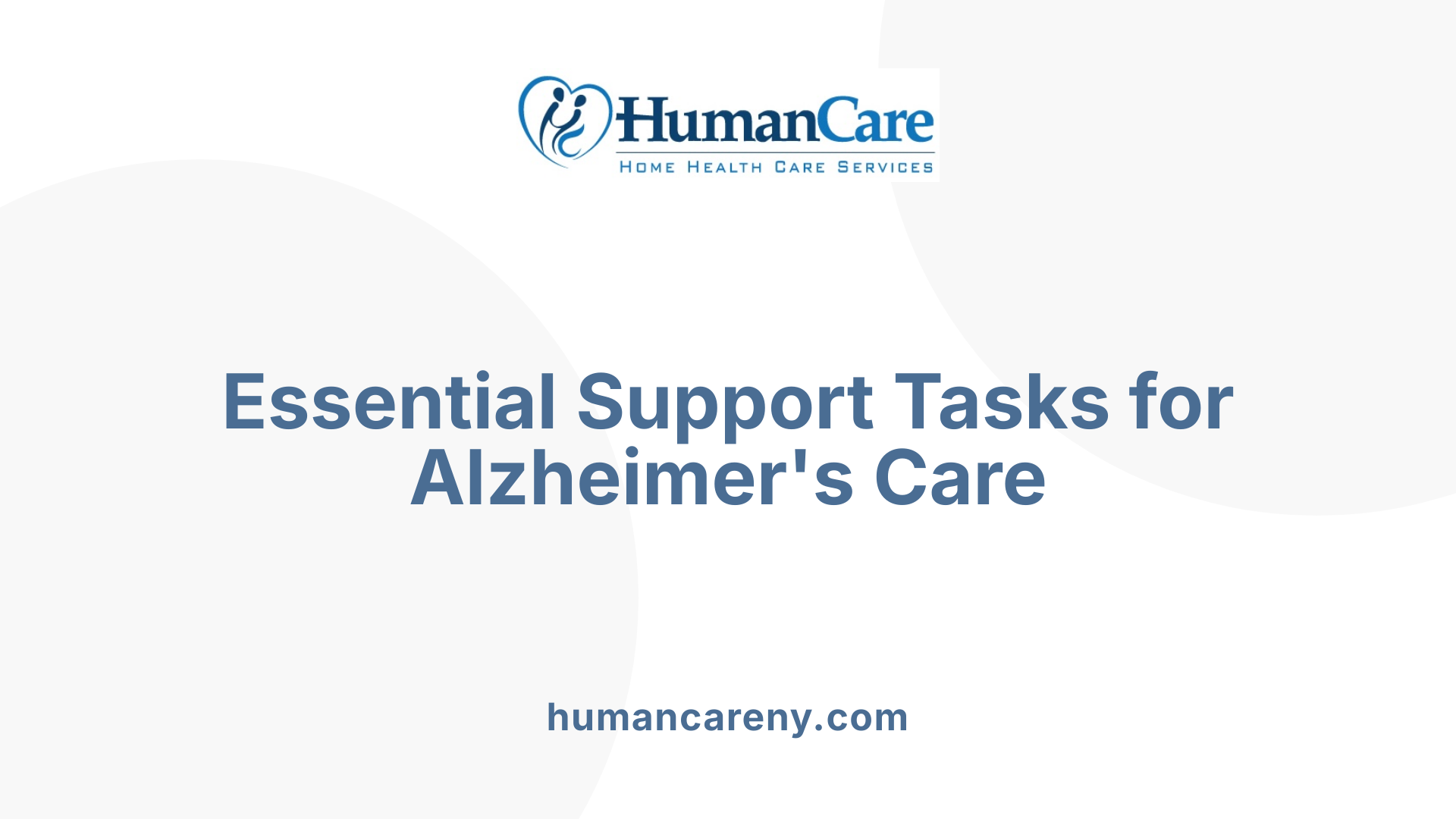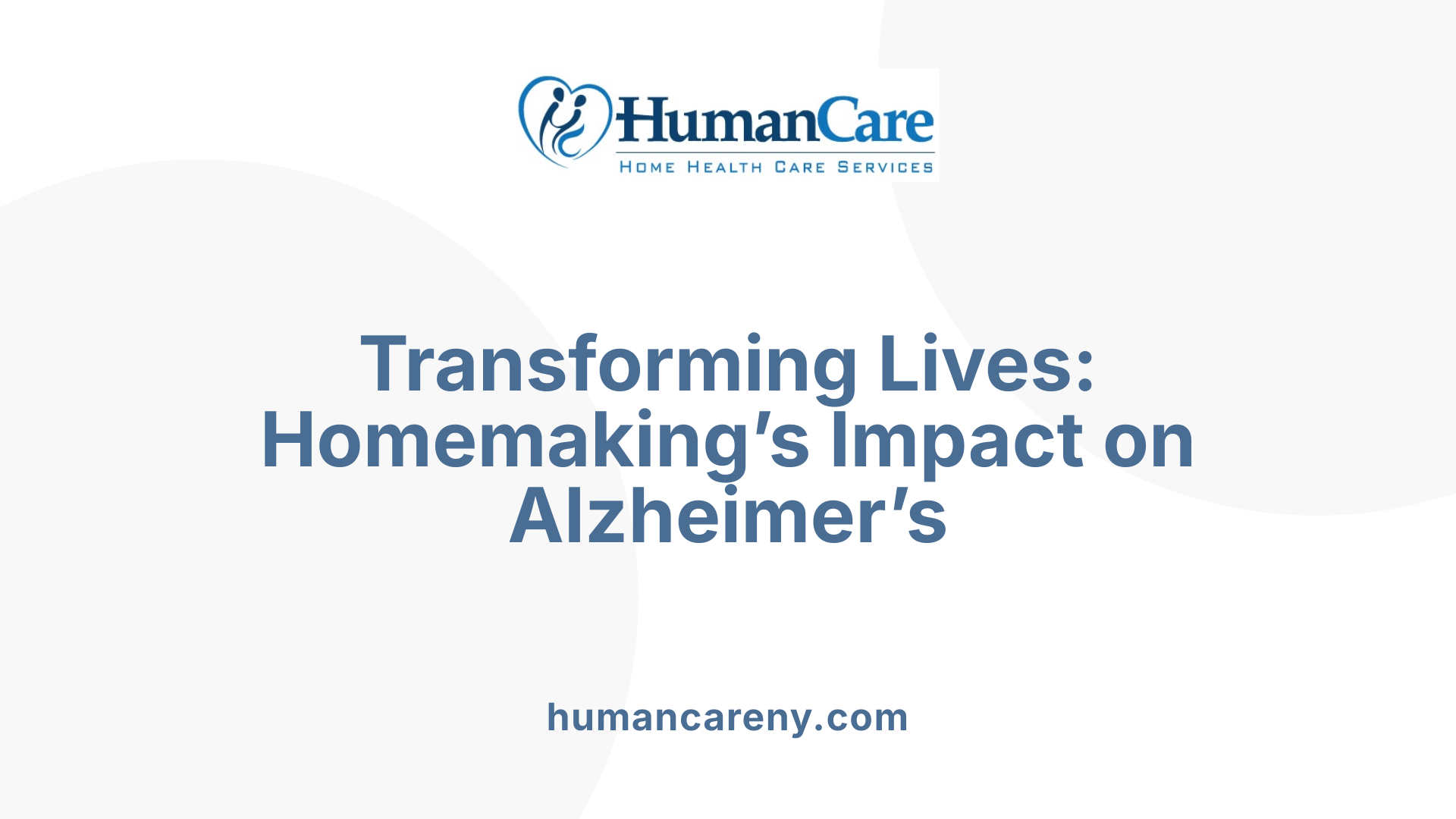Understanding the Role of Homemaking in Alzheimer’s Care
Homemaking services play a vital role in supporting elderly individuals with Alzheimer’s disease by providing comprehensive in-home assistance aimed at maintaining independence, ensuring safety, and enhancing well-being. These services are tailored to meet the specific needs of each individual, fostering a familiar environment that addresses medical, emotional, and daily living challenges posed by the condition.
Broad Spectrum of Homemaking Services for Alzheimer’s Care
What types of homemaking services are available for elderly individuals with Alzheimer's?
Homemaking services for seniors with Alzheimer’s include a wide range of supports designed to help them live comfortably and safely at home. These services encompass personal care assistance such as help with bathing, dressing, and eating, which becomes increasingly important as cognitive function declines.
Companion services and volunteer visits provide social interaction and supervision, helping reduce feelings of loneliness and confusion. Homemaker services support daily tasks like housekeeping, grocery shopping, and meal preparation, ensuring a clean living environment and nutritious diet.
For medical needs, licensed professionals offer skilled care such as wound treatment, injections, and physical therapy. These services are coordinated by healthcare agencies to address ongoing health conditions.
Additional in-home support options include transportation services for appointments and errands, medication reminders to ensure proper medication management, and emergency alert systems to enhance safety.
Community resources play an essential role, offering adult day centers that provide social activities, supervision, and meals, giving respite for family caregivers. Respite care services, available in-home or at facilities, temporarily take over caregiving duties to reduce burnout.
Legal and financial management support is also available, assisting families in planning for ongoing care costs and legal needs.
Overall, these associated services work together to support the individual’s independence, safety, and well-being—all within the familiarity of their own home environment.
Support Tasks Handled by Homemaking Services

What support tasks do homemaking services provide for elderly individuals with Alzheimer's?
Homemaking services are designed to give essential non-medical assistance to seniors with Alzheimer's disease, helping them maintain their independence in a safe environment. These services cover a wide range of daily support activities.
Primarily, homemaking aides assist with personal care routines such as bathing, dressing, toileting, and eating. These tasks become increasingly difficult as Alzheimer's progresses, and professional support can make a significant difference.
In addition to personal care, homemaking services include light housekeeping, meal preparation, and shopping. These help ensure that the living environment remains clean, safe, and nourishing, which is vital for overall health.
Companionship and emotional support are also important components. Care providers often engage residents in recreational activities, conversations, and hobbies that promote mental stimulation and emotional well-being.
To enhance safety, these services may incorporate home hazard assessments and safety modifications. Installing grab bars, removing tripping hazards, and ensuring proper lighting are common measures to prevent falls and accidents.
Furthermore, personalized care plans are tailored to address behavioral and cognitive challenges associated with Alzheimer's. Care providers use distraction techniques like music or snacks to manage agitation and foster calmness.
Overall, homemaking services aim to improve the quality of life for individuals with Alzheimer’s by keeping them safe and engaged, while providing peace of mind to their families.
Impact of Homemaking Services on Alzheimer’s Care

Maintaining independence and comfort
Homemaking services play a vital role in helping seniors with Alzheimer's maintain their independence and feel more comfortable in their daily routines. These services support essential activities such as bathing, grooming, dressing, and meal preparation, which become increasingly difficult as the disease progresses. By assisting with these tasks, homemaking services enable individuals to stay in their familiar home environment longer, fostering a sense of security and stability.
Early symptom management
In addition to daily assistance, homemaking services contribute to early symptom management by creating a safe living space. Home safety tips, like removing hazards and installing safety devices, help reduce the risk of falls and accidents. Caregivers often help with medication reminders and routine checks, which are crucial for managing early symptoms effectively. This proactive approach can prevent complications and support timely medical intervention.
Reducing behavioral challenges
People with Alzheimer's often experience behavioral challenges such as agitation, confusion, or aggression. Homemaking professionals trained in dementia care use distraction techniques, music, and snacks to calm patients and improve interactions. Creating a routine with cognitive exercises, sensory activities, and social engagement simplifies managing these behaviors and enhances emotional well-being.
Delaying institutionalization
One of the most significant benefits of homemaking services is their ability to delay the need for institutional care, like nursing homes or assisted living facilities. By providing personalized, consistent support at home, these services help seniors retain their independence longer. Comfortable, familiar surroundings lessen confusion and agitation, which are common in unfamiliar care settings. Consequently, seniors can enjoy a higher quality of life in the environment they know well.
| Aspect | Description | Additional Benefits |
|---|---|---|
| Maintaining independence | Supporting daily routines and personal care | Promotes dignity and self-reliance |
| Early symptom management | Creating safe environments and routine health checks | Helps prevent hospitalizations |
| Reducing behavioral issues | Using distraction and engagement techniques | Decreases agitation and improves mood |
| Delaying institutionalization | Supporting aging in place through personalized services | Extends time in familiar surroundings |
Overall, homemaking services are essential in creating a supportive, safe environment that enhances the quality of life for elderly individuals with Alzheimer’s while offering peace of mind to families and caregivers.
Guidance in Selecting the Right Homemaking Provider
 When choosing homemaking services for a loved one with Alzheimer's, families should start by researching local providers. Resources such as the Eldercare Locator or recommendations from healthcare professionals can point to reputable agencies. It's important to identify the specific needs of the individual, whether it’s assistance with bathing, dressing, meal preparation, or companionship.
When choosing homemaking services for a loved one with Alzheimer's, families should start by researching local providers. Resources such as the Eldercare Locator or recommendations from healthcare professionals can point to reputable agencies. It's important to identify the specific needs of the individual, whether it’s assistance with bathing, dressing, meal preparation, or companionship.
Evaluating the training and experience of potential service providers is crucial. Confirm whether caregivers are trained in dementia care and first aid, as these skills directly impact the quality and safety of the care provided. Ask about the agency’s licensing and check references or reviews to ensure reliability and good service.
Cost and insurance coverage are also vital considerations. Families should inquire about service rates, available payment options, and whether insurance or government assistance programs can offset expenses. Understanding payment plans helps in planning long-term care.
Building a care plan with a provider involves discussing routines, specific duties, and flexible service options. It's beneficial to choose an agency that offers personalized care plans and can adjust services as the condition progresses. Direct communication and clear expectations foster a trusting relationship and better care outcomes.
Involving healthcare providers or support groups can also aid in making an informed decision. These resources can supply additional guidance, ensure comprehensive care, and support families in managing the ongoing needs of loved ones with Alzheimer’s.
Emotional, Safety, and Medical Support Offered by Homemaking Services

What kind of emotional, safety, health, and caregiving support do homemaking services provide for elderly with Alzheimer’s?
Homemaking services for seniors with Alzheimer’s offer much more than basic household help. These services include emotional reassurance and companionship, which are essential for reducing feelings of loneliness and anxiety in individuals facing cognitive decline.
Safety is a top priority. Homemaking providers implement measures like securing home environments, removing hazards, and installing safety devices. They help prevent falls and accidents by supervising activities and encouraging safe movement around the house. Emergency alert systems and grab bars are often part of the safety setup to ensure quick assistance if needed.
In terms of health support, homemakers assist with medication reminders and help maintain daily routines such as bathing, dressing, and eating. They work alongside healthcare providers to coordinate medication and treatment plans, ensuring that health needs are promptly addressed. These services also include monitoring for changes in condition, helping to catch issues early.
Caregiver support is another vital aspect. Homemaking services provide respite for family caregivers, giving them necessary breaks to rest and recharge. They also facilitate communication with healthcare professionals and support the development of personalized care strategies to manage Alzheimer’s progression effectively.
Overall, homemaking services create a supportive environment that promotes independence and dignity while addressing the evolving emotional, safety, and health needs of elderly individuals with Alzheimer’s.
Enhancing Living Conditions and Promoting Well-Being

Memory Care Strategies
Implementing effective memory care strategies can significantly improve the daily lives of individuals with Alzheimer's. Memory care professionals often use distraction techniques, such as listening to music or enjoying snacks, to help calm patients and reduce agitation. Creating routines that include physical and mental exercises, memory games, and sensory activities can support cognitive health and emotional well-being.
Social and Recreational Activities
Keeping seniors engaged through social and recreational activities is vital. In-home care providers facilitate outings, games, and conversations to prevent loneliness and depression. These activities not only promote mental stimulation but also help maintain a sense of normalcy and joy.
Physical Exercises and Mental Stimulation
Regular physical exercises, tailored to individual abilities, help preserve mobility and overall health. Combining these with mental stimulation through activities like puzzles, memory exercises, and sensory engagement can slow cognitive decline and boost mood.
Environmental Safety Improvements
Making the home environment safer is crucial for independence and confidence. This includes removing hazards, installing safety devices, and creating a clutter-free space. Personalized safety tips—such as proper lighting and easy access to essentials—assist elderly individuals in moving around safely while maintaining their independence.
Supporting Families and Improving Quality of Life
Homemaking services are invaluable in providing comprehensive support for elderly individuals with Alzheimer’s disease. They help sustain independence, ensure safety, promote emotional well-being, and ease the burden on caregivers. With tailored interventions, trained professionals, and accessible community resources, these services enable seniors to enjoy a higher quality of life in the familiarity of their own homes while effectively managing the challenges of Alzheimer’s.
References
- In-Home Care
- Getting Help With Alzheimer's Caregiving
- Family Caregiver Services - California Department of Aging
- Tips for Caregivers and Families of People With Dementia
- Finding Dementia Care and Local Services
- How Personalized Home Care Benefits Seniors With ...
- At-Home Alzheimer's and Dementia Care
- In-Home Care
- Finding Dementia Care and Local Services
- Family Caregiver Services - California Department of Aging



